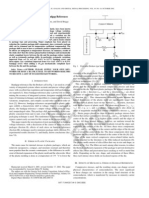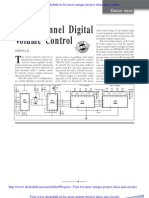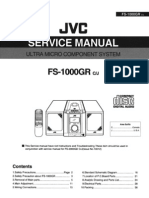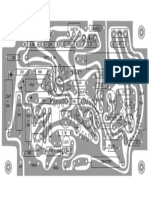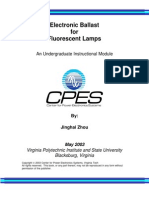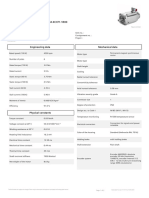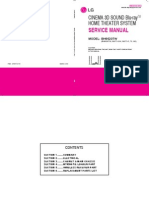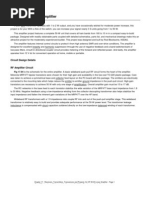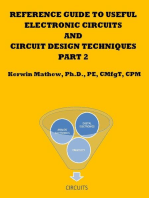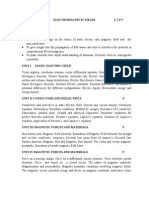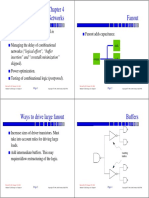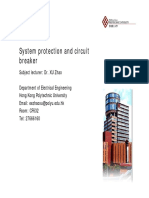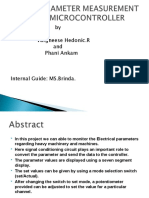Power Amplifier 65W With HEXFET
Power Amplifier 65W With HEXFET
Uploaded by
Lenin BabuCopyright:
Available Formats
Power Amplifier 65W With HEXFET
Power Amplifier 65W With HEXFET
Uploaded by
Lenin BabuOriginal Description:
Copyright
Available Formats
Share this document
Did you find this document useful?
Is this content inappropriate?
Copyright:
Available Formats
Power Amplifier 65W With HEXFET
Power Amplifier 65W With HEXFET
Uploaded by
Lenin BabuCopyright:
Available Formats
Power amplifier 65W with HEXFET
A medium power amplifier that is characterized by a lot of good sound quality, but simultaneously is very simple in the construction. Him uses, enough time in my active
loudspeakers. In his output stage exist the very good FET transistors, technology HEXFET, transistor which are controlled by voltage and no by current as the classically bipolar
transistors. The circuit has symmetrical designing, resolving thus the harmonic distortion problem. All the transistors that are used in the circuit are simple and they exist in big
clearings in the market. The pairs of differential amplifiers Q1-2 and Q3-4 should be matched between them and near the one in the other. Thus you can buy enough transistors of
types BC550C and BC560C, and with a multimeter you match between them creating pairs with same characteristics, ensuring thus uniform behavior in the temperature changes etc.
Networks RC from the R7/C3 and R12/C4 decrease the bandwidth of differential amplifiers and power amplifier in the 6.5MHZ. Resistors R8-9-10-11 function as local feedback in the
differential amplifiers improving the linearity. The differential amplifiers are supplied with constant current from him current sources Q5 and Q6. The bias of current sources becomes
from the combination of diodes LED D1, D2 and R20. This becomes because the combination transistor/LED ensures big thermic stability, for this reason should they are in very near
distance [1]. With the TR1 trimmer we regulate the bias current of output power stage. For this reason Q8 should find itself on the heatsink so that it ensures thermic stability in the
bias, so that it does not change with the temperature changes. The resistors R32-33 shape a local feedback bronchus in the output stage, because this functions as voltage amplifier.
With the TR1, R3-4, C14 we regulate the amplifier output DC offset voltage, near in the zero. The transistors Q8-10-11-12-13, [Fig.1] should are placed on heatsink, adding between
the transistors and the heatsink of good quality leaves mica and ointment. Inductor L1 is constituted by 6 coils of insulated cupreous wire of diameter 1.5mm, with internal inductor
diameter of 16mm [2].
Adjustment
Previous to we supply the amplifier with voltage, we regulate the trimmer TR2 in the mid of his way and the trimmer TR1 in biggest resistance. We connect a multimeter in output pin
J4 (measurement range 200mV DC), we give voltage in the amplifier and with the TR2 we regulate so that we take DC voltage in the output as possible near in the zero. We remove
the supply and connect a multimeter (range 1A or 2A) in line with one from the supply cables. We again give supply in the amplifier and with the TR1 regulate late the current, so that
we take clue roughly 330mA. We leave the amplifier to work for 10 min., without audio signal in his input. Afterwards the 10-min. usually the current stabilized in 230mA roughly. If it
needs we adjust late so that we take clue near in 230mA. We again check the amplifier DC offset [J4] output, for changes DC and if it needs we regulate again with the TR2.
[Elektor12/93].
DC Protection / Time Delay for Loudspeaker
Part List
R1-15-16-21-22-17-18=1Kohm
R33=68ohm 5W
R3-4=10Mohm
TR1=1Kohm trimmer
R2=47Kohm
R5-6-13-14=1.2Kohm
Q1-2=BC550C [matched]
R35-36=6.8ohm 1W
Q3-4=BC560C [matched]
Q5=BC560C
TR2=1Mohm trimmer
R7-12=47ohm
Q6=BC550C
C1=2.2uF 63-100V MKT
R8-9-10-11=22ohm
Q7-11=BD140
C2=1nF 100V MKT
R19=82ohm
Q8-9-10=BD139
C3-4=2.7nF 100V MKT
R20=22Kohm
Q12=IRF9540
C5=330pF ceramic or mylar
R23-26=56ohm
Q13=IRF540
C6-7=100uF 16V
R24=2.2Kohm
F1-2=Fuse 2.5A Fast
C8=1uF 100V MKT
R25=560ohm
L1=see text
C9-11-12=100nF 100V MKT
R27-30=150ohm
C10-13=470uF 63V
R28-29-31-34=15ohm
C14=33nF 100V MKT
R32=150ohm 5W
Q8-10-11-12-13 on Heatsink
D1-2=LED RED 3mm [see text] [1]
.
SPECIFICATIONS
POWER RATING at 1KHZ with 0.1% THD
IMD
THD at 60W into 8 ohm and 1 KHZ
THD at 60W into 8 ohm and 20 HZ....20 KHZ
FREQUENCE RESPONSE [at 35W/8ohm,
+0...-3dB]
INPUT SENSITIVITY
PUT IMPEDANCE
SLOW RATE with input filter
SIGNAL TO NOISE RATIO [at 1W/8ohm]
DAMPING FACTOR at 8ohm [20HZ...20KHZ]
[2]
J1= 2pin connector 2.54mm step
All the resistors is 1/4W 1% except quote differently
63W/ 8 ohm, 105W /4 ohm
<0.008%
<0.005%
<0.05%
1.5 HZ.....125 KHZ
1Vrms
48K
20V/uS
>99dBA
160
Power Supply
The power supply circuit, is a classic circuit. Proposed power supply for amplifier 65W HEXFET is what appears in the above form. It has separated supply for the
various supply stages, for power output stage, for control stage, for preamplifier supply and for protection stage. Whoever wants it can suppress department or
add a power supply for each channel, separating completely the channels between them. For whoever it does not use the preamplifier circuit and protection can
suppress proportional coil. In his input exist the soft starting circuit, that combine with the delay circuit and protection loudspeakers from DC.
Output Voltages For Power Supply
+V1=+35V
-V1=-35V
+V3=+35V
-V3=-35V
+V2=+12V
T1=2X25Vac 160VA //2X15Vac 20VA
T2=2X25Vac 160VA
C5-8=1000uF 25V
-V2=-12V
Part List
C6-9=100nF 100V MKT
IC2=7912 Regulator
F1=FUSE 2A slow block
BR1-3=200V 35A Bridge Rectifier
C7-10=10uF 25V
C1...4-11...14=10000uF 63V
IC1=7812 Regulator
BR2=4 X 1N4002
C15=33nF 630V Class X2
Fig.2--POWER AMP. 65W HEXFET [TOP SIDE] PCB
S1=2X2 switch 10A
JF1=3 pole male plug
Fig.3--POWER AMP. 65W HEXFET [Bottom side] PCB
Sam Electronic Circuits 8/02
[ Home ] [ My Database ] [My Guestbook ]
You might also like
- Yamaha Mw12Document83 pagesYamaha Mw12Jose luis100% (1)
- Samsung HT Z120Document76 pagesSamsung HT Z120Marcos OficinaNo ratings yet
- S1A0426Document4 pagesS1A0426German Dfr100% (1)
- Ed Laboratory Dsa8400Document2 pagesEd Laboratory Dsa8400Jose Cesar Souza GebaraNo ratings yet
- Ieee Proof: Voltage Shift in Plastic-Packaged Bandgap ReferencesDocument5 pagesIeee Proof: Voltage Shift in Plastic-Packaged Bandgap ReferencesNisar WaniNo ratings yet
- Mighty Midget CompleteDocument10 pagesMighty Midget CompleteBailey AplinNo ratings yet
- A Paul Kemble Web Page - Mission Cyrus 1 Integrated Amplifier2 PDFDocument3 pagesA Paul Kemble Web Page - Mission Cyrus 1 Integrated Amplifier2 PDFZafer ÖzerNo ratings yet
- The Complementary SziklaiDocument4 pagesThe Complementary SziklaiGabriel Burgos100% (1)
- 0 50v Variable Power Supply Circuit at 3aDocument8 pages0 50v Variable Power Supply Circuit at 3aSohail AhmedNo ratings yet
- LM12 150W Audio AmplifierDocument6 pagesLM12 150W Audio AmplifierJuan Sánchez LópezNo ratings yet
- 1605Document8 pages1605Yuda AditamaNo ratings yet
- Overture Design Guide15Document93 pagesOverture Design Guide15eleceng1979100% (1)
- Digital Audio Input SelectorDocument2 pagesDigital Audio Input SelectorchakralabsNo ratings yet
- Sussex Valve Tester Panel LayoutDocument1 pageSussex Valve Tester Panel LayoutIsa CamposNo ratings yet
- Dual Channel Volume ControlDocument2 pagesDual Channel Volume Controlchakralabs100% (1)
- Eat Produktions GMBH (Scandi-Tool)Document28 pagesEat Produktions GMBH (Scandi-Tool)kossamosNo ratings yet
- Build A Theremin Using Three AM Radios PDFDocument4 pagesBuild A Theremin Using Three AM Radios PDFNuno JacintoNo ratings yet
- Sony xm-475gsx Ver-1.2 SM PDFDocument38 pagesSony xm-475gsx Ver-1.2 SM PDFelmoyNo ratings yet
- HifiDocument50 pagesHifigolddigger19890% (1)
- Digitech rp50 Guitar Multi Effects PedalDocument6 pagesDigitech rp50 Guitar Multi Effects PedalcarlosNo ratings yet
- Service Manual: VCD Stereo Radio Cassette RecorderDocument62 pagesService Manual: VCD Stereo Radio Cassette RecorderVidal VelasquezNo ratings yet
- 43Lj5000 Webos Led TV Main Board Layout: 2017 Direct View TV TrainingDocument4 pages43Lj5000 Webos Led TV Main Board Layout: 2017 Direct View TV TrainingIglesia en Casa ComunidadNo ratings yet
- Digital DiceDocument3 pagesDigital DicechakralabsNo ratings yet
- Sony kdl-46x4500 kdl-55x4500 Chassis Eg1h Taiwan PDFDocument60 pagesSony kdl-46x4500 kdl-55x4500 Chassis Eg1h Taiwan PDF高立璋No ratings yet
- Kaito ManualDocument150 pagesKaito ManualChugo LimaNo ratings yet
- Audinac AT1000 - Con - ValoresDocument1 pageAudinac AT1000 - Con - ValoresElectroTecno MzaNo ratings yet
- FOSTEX 6301b Service ManualDocument12 pagesFOSTEX 6301b Service ManualRitekk Dirgo100% (1)
- Boss SD-1 Super Overdrive Pedal Schematic DiagramDocument3 pagesBoss SD-1 Super Overdrive Pedal Schematic DiagramIlya FuksmanNo ratings yet
- TL082CNDocument9 pagesTL082CNRonald CifuentesNo ratings yet
- Ballast 1Document17 pagesBallast 1api-3709876No ratings yet
- Snubber Design (RC Snubber)Document10 pagesSnubber Design (RC Snubber)Mohammad Hefdi UnoNo ratings yet
- Low Cost 150 Watt Amplifier CircuitDocument5 pagesLow Cost 150 Watt Amplifier CircuitJyothsna VayyalaNo ratings yet
- 1FK7044-4CH71-1RH0 Datasheet enDocument2 pages1FK7044-4CH71-1RH0 Datasheet enJhonatan Garcia100% (1)
- 60-80W Power AmplifierDocument7 pages60-80W Power AmplifierBerrie SchwarzNo ratings yet
- Esquemas de Circuitos ElectrónicosDocument45 pagesEsquemas de Circuitos ElectrónicosAlejandro Patiño JNo ratings yet
- Acer Aspire 3050 Quanta ZR3 Laptop Schematics PDFDocument31 pagesAcer Aspire 3050 Quanta ZR3 Laptop Schematics PDFMaxmílian CostaNo ratings yet
- As 62103-2006 Electronic Equipment For Use in Power InstallationsDocument8 pagesAs 62103-2006 Electronic Equipment For Use in Power InstallationsSAI Global - APACNo ratings yet
- x64dbg DocumentationDocument281 pagesx64dbg DocumentationBakayoko KaderNo ratings yet
- Tabela de Caracteristicas de Transistores BC e BD PDFDocument3 pagesTabela de Caracteristicas de Transistores BC e BD PDFCarlos Karl100% (1)
- IM ZLX enDocument48 pagesIM ZLX enLOVITECNo ratings yet
- Audio Circuits Using The NE5532/34Document11 pagesAudio Circuits Using The NE5532/34Jose Simon Bolivar MoranNo ratings yet
- Manual de Servicio Radio Base Kenwood Modelo TK-7102H-InglésDocument43 pagesManual de Servicio Radio Base Kenwood Modelo TK-7102H-InglésJorge Alvaro Lopez CervantesNo ratings yet
- NC252MP: High Efficiency Self Contained Amplifier ModuleDocument17 pagesNC252MP: High Efficiency Self Contained Amplifier ModuleMeego TestsNo ratings yet
- LG Bh9520twDocument147 pagesLG Bh9520twdanielradu27100% (1)
- JVC KDR 400 Service Manual PDFDocument44 pagesJVC KDR 400 Service Manual PDFTim SafonovNo ratings yet
- The Transistor Tester User Manual (Newly)Document7 pagesThe Transistor Tester User Manual (Newly)Tanel Laanemägi100% (1)
- Schematic - Receptor Oc Fet - 2022!05!03Document1 pageSchematic - Receptor Oc Fet - 2022!05!03Doni SouzaNo ratings yet
- Iaw 4GV-4HV VagDocument2 pagesIaw 4GV-4HV VagrubenbslNo ratings yet
- Sony Cdx-gt310 Ver-1.3 SMDocument37 pagesSony Cdx-gt310 Ver-1.3 SMMarco GalanNo ratings yet
- Cambridge Azur 540P-640P Service ManualDocument16 pagesCambridge Azur 540P-640P Service ManualRoger Martínez BermúdezNo ratings yet
- Planilla de ILED ProtegidaDocument56 pagesPlanilla de ILED Protegidaalberto laroccaNo ratings yet
- Technoblogy - ATtiny85 Bargraph VoltmeterDocument6 pagesTechnoblogy - ATtiny85 Bargraph VoltmeterreynielNo ratings yet
- Acer Aspire A515-51G C5V01 LA-E892P R1A Lid-170216-CsdDocument3 pagesAcer Aspire A515-51G C5V01 LA-E892P R1A Lid-170216-CsdMiiguel RiícoNo ratings yet
- A Balanced Input For Microphones Can Solve Hum and Noise Pickup ProblemsDocument16 pagesA Balanced Input For Microphones Can Solve Hum and Noise Pickup ProblemsTitán SotoNo ratings yet
- NIKIDocument9 pagesNIKICostinNo ratings yet
- 300w tp9383 PDFDocument3 pages300w tp9383 PDFlu1agp100% (1)
- 13-Transistor Transceiver For Digital Kit Assembly Manual: DraftDocument28 pages13-Transistor Transceiver For Digital Kit Assembly Manual: Draftfox7878No ratings yet
- Audio Line High-End Preamplifier With ICsDocument3 pagesAudio Line High-End Preamplifier With ICsRahul DevaNo ratings yet
- An HF 50-W Linear AmplifierDocument8 pagesAn HF 50-W Linear AmplifierEdward Yanez100% (1)
- FinalDocument16 pagesFinalgax4bab100% (1)
- Reference Guide To Useful Electronic Circuits And Circuit Design Techniques - Part 2From EverandReference Guide To Useful Electronic Circuits And Circuit Design Techniques - Part 2No ratings yet
- Ac188k PDFDocument4 pagesAc188k PDFLenin BabuNo ratings yet
- Data Sheet 2Document3 pagesData Sheet 2Lenin BabuNo ratings yet
- Data PDFDocument4 pagesData PDFLenin BabuNo ratings yet
- Actsrom PDFDocument114 pagesActsrom PDFLenin BabuNo ratings yet
- 60 W Hi-Fi Dual Audio Driver: DescriptionDocument12 pages60 W Hi-Fi Dual Audio Driver: DescriptionLenin BabuNo ratings yet
- 6-1 Wiring Diagram - Main BoardDocument4 pages6-1 Wiring Diagram - Main BoardLenin BabuNo ratings yet
- Jameco Part Number 936343: Distributed byDocument5 pagesJameco Part Number 936343: Distributed byLenin BabuNo ratings yet
- Canon Lbp2900 Lbp3000 Series SMDocument106 pagesCanon Lbp2900 Lbp3000 Series SMLenin Babu100% (1)
- CoverDocument3 pagesCoverLenin BabuNo ratings yet
- Booklet #1: Genesis - ExodusDocument32 pagesBooklet #1: Genesis - ExodusLenin BabuNo ratings yet
- Disassembly & ReassemblyDocument4 pagesDisassembly & ReassemblyLenin BabuNo ratings yet
- CoverDocument3 pagesCoverLenin BabuNo ratings yet
- LCD TV Repair Case HistoriesDocument33 pagesLCD TV Repair Case HistoriesLenin BabuNo ratings yet
- Troubleshooting: 4-1 Checking Before RepairingDocument19 pagesTroubleshooting: 4-1 Checking Before RepairingLenin BabuNo ratings yet
- Indian Heroes and Great ChieDocument56 pagesIndian Heroes and Great ChieLenin BabuNo ratings yet
- Upakari PosterDocument1 pageUpakari PosterLenin BabuNo ratings yet
- Laptop Chip Level Repair Classroom Notes PDFDocument108 pagesLaptop Chip Level Repair Classroom Notes PDFLenin BabuNo ratings yet
- 7MBR25SA120: IGBT MODULE (S Series) 1200V / 25A / PIMDocument8 pages7MBR25SA120: IGBT MODULE (S Series) 1200V / 25A / PIMBruno AlvesNo ratings yet
- Zener Diode+regulationDocument10 pagesZener Diode+regulationammadm540No ratings yet
- AD22300, AD22301, AD22302: 3.3V Single and Dual Axis Automotive iMEMS AccelerometersDocument5 pagesAD22300, AD22301, AD22302: 3.3V Single and Dual Axis Automotive iMEMS AccelerometersHugo D. Alvarez100% (1)
- Activity 1.3.1 Solar Hydrogen System - VexDocument7 pagesActivity 1.3.1 Solar Hydrogen System - Vexapi-291536844No ratings yet
- Bifacial Solar Cells - A Brief Overview: Ingrid RomijnDocument28 pagesBifacial Solar Cells - A Brief Overview: Ingrid Romijnnikhill kundarNo ratings yet
- 60 Watt MosFet Audio Amplifier - RED - Page100Document3 pages60 Watt MosFet Audio Amplifier - RED - Page100Laurentiu DraganNo ratings yet
- Goldstar Repair Tips (ET)Document11 pagesGoldstar Repair Tips (ET)Nandor KermeciNo ratings yet
- Traffic Controller Using Microprocessor 8085: YEAR-2011Document69 pagesTraffic Controller Using Microprocessor 8085: YEAR-2011Raj LuckyNo ratings yet
- ZXLD1360: V GND LXDocument25 pagesZXLD1360: V GND LXyusufwpNo ratings yet
- Electromagnetic FieldsDocument2 pagesElectromagnetic FieldsAnonymous JnvCyu85No ratings yet
- Topics Chapter 4 Combinational Logic Networks FanoutDocument8 pagesTopics Chapter 4 Combinational Logic Networks FanoutChai Foong KitNo ratings yet
- STK4211V: 2-Channel 70 W Min AF Power Amplifier (Split Power Supply)Document3 pagesSTK4211V: 2-Channel 70 W Min AF Power Amplifier (Split Power Supply)mundomusicalmeriaNo ratings yet
- Chris DeArmitt PHD ThesisDocument160 pagesChris DeArmitt PHD Thesisalinbu2007No ratings yet
- SS9A - Parallel and Series CircuitsDocument3 pagesSS9A - Parallel and Series CircuitsImranHashmiNo ratings yet
- EE3741 L6 Switchgear and ProtectionDocument45 pagesEE3741 L6 Switchgear and ProtectiondebealNo ratings yet
- Microondas Sanyo EM-G2553 - SM - EMS1053 - 1563 - 3553 PDFDocument24 pagesMicroondas Sanyo EM-G2553 - SM - EMS1053 - 1563 - 3553 PDFnicolasbaz01No ratings yet
- ESP System ApplicationsDocument13 pagesESP System Applicationssindy amaliaNo ratings yet
- DC Experiment 4Document3 pagesDC Experiment 4nepNo ratings yet
- Introduction To Sentaurus TCADDocument47 pagesIntroduction To Sentaurus TCADSakshiKoulNo ratings yet
- Catalogo Contactores en Vacio MitsubichiDocument16 pagesCatalogo Contactores en Vacio MitsubichiWalter CataldoNo ratings yet
- A Modified Luo Converter-Based Electric Vehicle Battery Charger With Power Quality ImprovementDocument10 pagesA Modified Luo Converter-Based Electric Vehicle Battery Charger With Power Quality ImprovementRAMESH BABU EEENo ratings yet
- VLSI Interview Questions With AnswersDocument15 pagesVLSI Interview Questions With AnswersMohamedNo ratings yet
- Vlsi FinalDocument155 pagesVlsi FinalRubini RavichandranNo ratings yet
- EE 6351 - Electrical Drives and Controls (EDC) QBDocument160 pagesEE 6351 - Electrical Drives and Controls (EDC) QBkannanchammyNo ratings yet
- Facts Unit-5 and 6Document48 pagesFacts Unit-5 and 6Mary MorseNo ratings yet
- Denon DCM-380 User ManualDocument53 pagesDenon DCM-380 User Manualbbs0814sc0% (1)
- Transistor: What Is A Transistor and How Does It WorkDocument7 pagesTransistor: What Is A Transistor and How Does It WorkmonalisaNo ratings yet
- Micro Controller ProjectDocument12 pagesMicro Controller Projecthedo7No ratings yet
- Semiconductor DeviceModelingDocument33 pagesSemiconductor DeviceModelingpraveenaprabhuNo ratings yet




